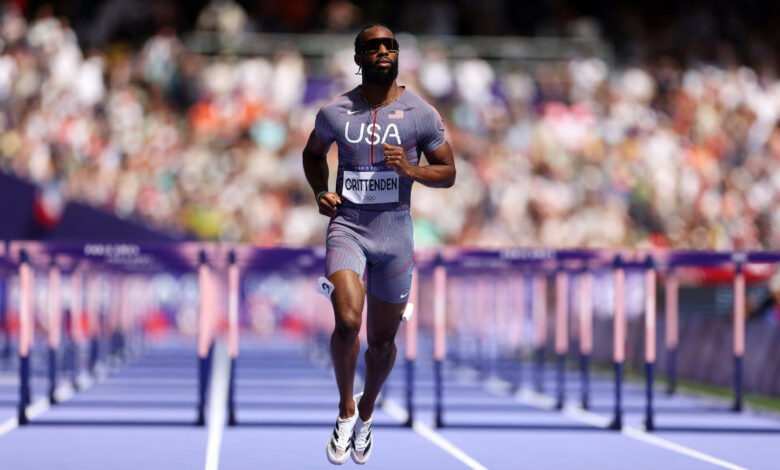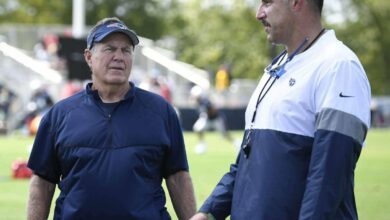What is a Repechage? Explaining the New Olympic Track Rule Embraced by a US Hurdler

Follow the live coverage of the 100m final and more athletics events at the 2024 Paris Olympics
It’s not often that a new twist is introduced into Olympic sports, especially one that can be a complete game-changer for athletes. But for those watching track and field in Paris this year, that’s exactly what they’ll see: the introduction of repechages in specific races.
And it didn’t take long for an American athlete to start using the new addition strategically. Here’s what you need to know about the repechage rounds.
What is a second chance round?
It’s a second chance for runners. In individual races ranging from the 200-meter sprint to the 1,500 meters, as well as the 110 meters and 400 meters hurdles, runners who didn’t automatically qualify for the semifinals in their first round get another chance to make it to the semifinals. In layman’s terms, it’s a mulligan.
Previously, the semi-finals in these types of races were determined by the top finishers from each first round and the fastest times thereafter, regardless of heat.
It is striking that the 100 meter sprint (where Julien Alfred was already crowned women’s champion) does not have a repechage. The longer distances and steeplechase do not either.
What does this mean for runners?
It gives elite runners who got off to a bad start or struggled during a race, and missed out on automatic qualification, a second chance to advance to the rounds. However, it also means that some track races have now gone from three rounds to four, putting additional strain — both mentally and physically — on athletes. But it also means that every athlete running the 200 through 1,500 is guaranteed at least two races at the Olympics.
Depending on the race, two to six athletes will advance to the semi-finals in each repechage round.
Why was this change made?
The change was announced in July 2022 by World Athletics, the umbrella organization for international athletics.
“After consultation with our athletes and broadcasters, we believe this is an innovation that will make progress in these events easier for athletes and increase anticipation for fans and broadcasters,” World Athletics President Sebastian Coe said in a press release at the time of the announcement. “The Repechages will bring greater attention to our sport during the peak period of the Olympic Games and will be carefully planned to ensure that every event on our Olympic programme retains its share of the spotlight.”

On Saturday, runners will compete in the men’s 1,500-meter repechage, a new round that gives runners who didn’t qualify in their heat a second chance at the Olympics. (Kevin Voigt/Getty Images)
When do the resits take place?
The first repechage rounds took place Saturday — in the women’s 800 meters and the men’s 1,500 meters. Six runners qualified for the semifinals after the repechage rounds. The next repechage rounds are Monday. Here’s the full remaining schedule.
Monday
Women’s 400m Hurdles: 4:50 a.m. ET
Men’s 400m: 5:20am ET
Women’s 200m: 6:50am ET
Tuesday
Men’s 110m Hurdles: 4:50 a.m. ET
Women’s 400m: 5:20am ET
Men’s 400 Meter Hurdles: 6:00 a.m. ET
Men’s 200m: 6:30am ET
Wednesday
Women’s 1500m: 6:45am ET
Thursday
Women’s 100m Hurdles: 4:35 a.m. ET
Men’s 800m: 6:00am ET
For athletes who make it through the repechages, the turnaround is quick. The semifinals are the following evening for most of those events. In the women’s 200 meters, the winners of the morning repechages race in the semifinals that evening.
Does this have strategic implications?
On Sunday, American hurdler Freddie Crittenden stopped right in his first lap of the men’s 110-meter hurdles, lightly jogging to the finish in 18.27 seconds, nearly five seconds behind the leader. After the race, he told NBC’s Lewis Johnson that he did it on purpose because he was battling an injury and wanted to preserve his body for the repechage round.
“It was a conscious decision,” Crittenden said. “Everybody comes through to the rematch. … So I just decided to not make an emotional choice, but make a smart choice, give my body time to recover a little bit from the aggravation, lean on my doctors, lean on God, and just wait for the rematch, come out here and try to kill it in the rematch.”
The top three finishers in each heat advance to the 100-meter semifinals, so if Crittenden had tried to make the top three and failed, he would have ended up in the repechage round anyway — but after taxing his body. By saving himself, he will theoretically be racing against a weaker field, with all the fastest racers already advanced, while also potentially saving himself from an extra all-out effort.
(Photo of American hurdler Freddie Crittenden taking a stroll around the hurdles course during the Olympics on Sunday: Hannah Peters/Getty Images)




